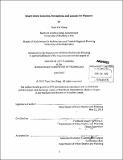| dc.contributor.advisor | Joseph Ferreira, Jr. | en_US |
| dc.contributor.author | Ching, Tuan Yee | en_US |
| dc.contributor.other | Massachusetts Institute of Technology. Department of Urban Studies and Planning. | en_US |
| dc.date.accessioned | 2013-09-24T19:45:49Z | |
| dc.date.available | 2013-09-24T19:45:49Z | |
| dc.date.copyright | 2013 | en_US |
| dc.date.issued | 2013 | en_US |
| dc.identifier.uri | http://hdl.handle.net/1721.1/81146 | |
| dc.description | Thesis (M.C.P.)--Massachusetts Institute of Technology, Dept. of Urban Studies and Planning, 2013. | en_US |
| dc.description | Cataloged from PDF version of thesis. | en_US |
| dc.description | Includes bibliographical references (p. 127-137). | en_US |
| dc.description.abstract | Today, there appears to be a visible trend in the use of the "smart" prefix. For example, cities are branding themselves as, or striving to become "smart" cities. Planners and policy-makers espouse "smart growth". Infrastructure planning involves "smart grids" for energy, "smart networks" for information and communications technologies (ICTs) and "smart mobility" in transportation. The "smart" term has also been stretched, where being "smart" is trounced by being "smarter". Being "smart", or "smarter", is perhaps seen as the next frontier for city planning, policy-making and management. A common underlying theme in "smart" cities is the application of technology to city planning and management, that leads to greater optimization of time and resources. However, definitions of "smart" cities remain elusive, and an inadequate understanding may lead cities to possible image or technological traps, heavy investments in ICTs and infrastructure without maximizing their potential, or to focus on "smart" technologies for short-term solutions without adequately considering the long term. As cities grapple with rapid urbanization and goals for sustainable development, resource management and climate change mitigation, learning about being "smart" will be timely and invaluable for planners. This study examines six "smart" cities - Boston, San Francisco, Amsterdam, Stockholm, Singapore and Rio de Janeiro - assessing city officials' perceptions and concepts of "smart cities" and their "smart" initiatives. Their efforts and approaches are analyzed against four theories of "smart" cities; (a) "smart machines" and organization, (b) engaging communities, organizations and businesses, (c) learning and adaptation, and (d) investing for the future. From the research, learning points and best practices are extracted, to serve as an applicable guide for cities as they embark on their "smart" initiatives. | en_US |
| dc.description.statementofresponsibility | by Tuan-Yee Ching. | en_US |
| dc.format.extent | 144 p. | en_US |
| dc.language.iso | eng | en_US |
| dc.publisher | Massachusetts Institute of Technology | en_US |
| dc.rights | M.I.T. theses are protected by
copyright. They may be viewed from this source for any purpose, but
reproduction or distribution in any format is prohibited without written
permission. See provided URL for inquiries about permission. | en_US |
| dc.rights.uri | http://dspace.mit.edu/handle/1721.1/7582 | en_US |
| dc.subject | Urban Studies and Planning. | en_US |
| dc.title | Smart cities : concepts, perceptions and lessons for planners | en_US |
| dc.type | Thesis | en_US |
| dc.description.degree | M.C.P. | en_US |
| dc.contributor.department | Massachusetts Institute of Technology. Department of Urban Studies and Planning | |
| dc.identifier.oclc | 858283316 | en_US |
